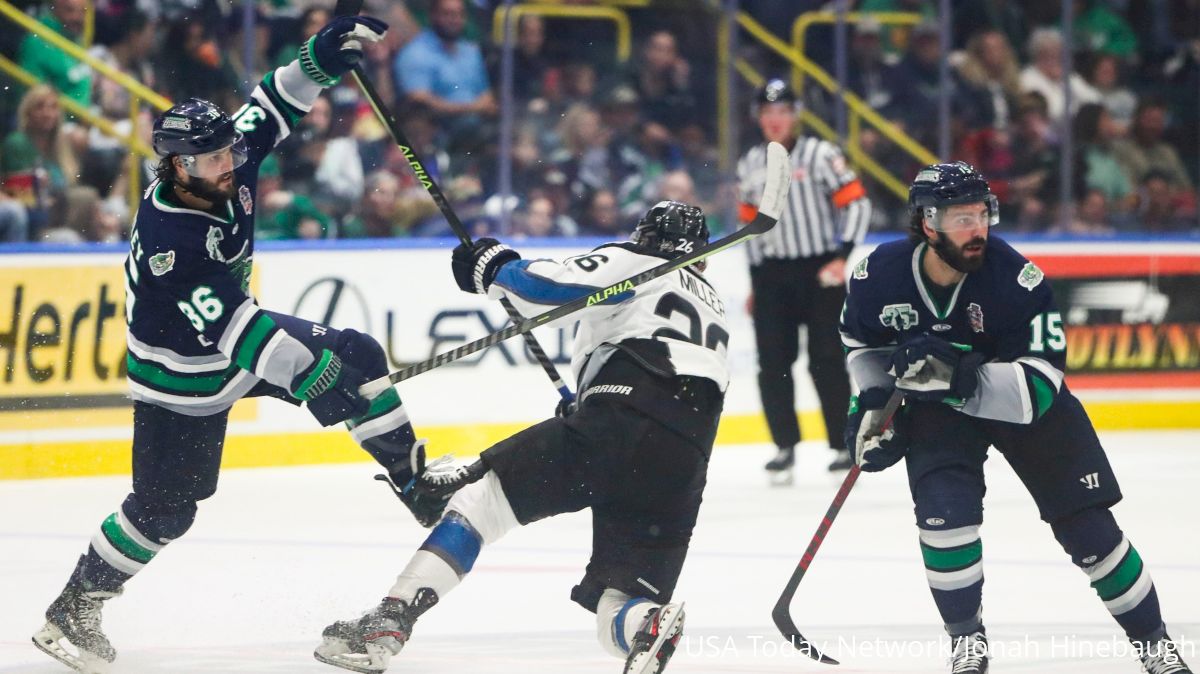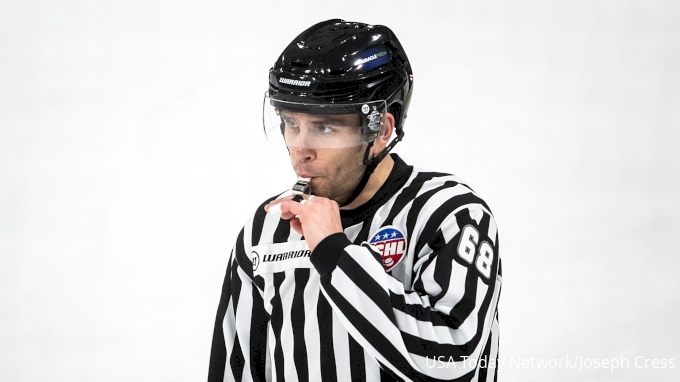ECHL: On-Ice Officials Do A Good Job, Believe It Or Not
ECHL: On-Ice Officials Do A Good Job, Believe It Or Not
FloHockey's Justin Cohn shares his thoughts about the officiating in the ECHL.

Brace yourselves for what I’m going to tell you, ECHL fans, because I know many of you don’t want to hear this: The officiating in this league is pretty darn good.
Yes, you read that correctly.
Anyone who follows me on social media (@sportsicohn on all platforms) knows I put ECHL officials under the microscope often. I take no joy in it, and frankly, I get tired of critiquing it. But the simple fact is that the fan base in Fort Wayne, Indiana, is ravenous and expects me to break down all things that impact the Komets’ games, and ECHL officiating has impacted a lot of them.
Last season was torpedoed by a bad decision – a Fort Wayne goal was overturned by a soft goaltender interference call with 1:11 remaining in a Game 7, handing the Cincinnati Cyclones a 1-0 victory – and already this season, I’ve seen two botched calls help set up opposing victories.
On the power playyyy @Jalen_Smereck pic.twitter.com/9vbd0kpmDC
— Cincinnati Cyclones (@CincyCyclones) May 4, 2023
One was a game-winning goal by the Toledo Walleye’s Brandon Hawkins that should have been blown dead for being a touch offside, the other was an overtime shootout cemented by the Indy Fuel’s Cameron Hillis, who clearly halted his forward progress and shouldn’t have been granted a goal.
Officiating is a thankless job. You tend to only hear about the few things you do wrong, not the countless things you do right. And once you consider that, and understand ECHL officials don’t have the infrastructure to succeed like the officials in the NHL or American Hockey League do, I think you’ll see them in a different light and appreciate them a little more.
At least I hope you do.
When you watch hockey games at the higher levels, I want you to consider the following things:
- They have the two-referee system in 100% of their games; coaches can challenge plays, so glaring mistakes often are fixed.
- Their video reviews are in sparkling, multi-angle high definition, so they can accurately determine if there was goaltender interference, a high stick, a hand pass – or if a play was offside.
- They have the pick of the litter when it comes to finding the best referees and linesmen.
I recently sat down with the ECHL’s vice president of hockey operations, Joe Ernst, to discuss the state of ECHL officiating. He oversees it, though he’s handed off many of the duties in recent years to Riley Yerkovich, the manager of officiating.
Ernst and I don’t always agree – for example, he thinks the call in the Cincinnati/Fort Wayne series was correct – still, I can’t help but appreciate the obstacles his officials are up against and find myself thinking, “Yeah, they do a good job, all things considered.”
The biggest thing people forget is that the ECHL is a developmental league, not only for the players and coaches, but also for the officials.
Seriously, we expect a young defenseman will get caught flat-footed from time to time, we accept that even the elite ECHL forwards are going to turn the puck over when they should be passing, we know coaches in the ECHL haven’t developed the skills to ascend to the AHL, yet we expect perfection from the referees and linesmen? That doesn’t make sense.
They’re young, they’re learning, they’re underpaid and beleaguered by travel and sometimes working other jobs, and they’re trying to make it to the next level just like the players. Isn’t it possible they’re doing a good job, and we don’t appreciate it?

Around 42 former ECHL officials have ascended to the NHL, compared to the around 740 ECHL players who have made it to the NHL, which doesn’t seem to be a bad clip. Especially when you consider that, especially in recent years, the NHL and AHL have begun identifying prospective officials, many of them former players, and moving them straight to the AHL, instead of having them start in the ECHL.
A lot of that has to do with professional hockey moving to the two-referee system – the NHL went to it in 1998, the AHL in 2011 – creating a dearth of quality officials at the lower levels.
The ECHL began using two referees in the 2016 playoffs, then last season began doing it in the regular season for 25% of each team’s home games. They’d love to have two referees in more games, but there’s not the supply. (A shortage of officials in all sports, at all levels, is a major problem right now, and you can blame obnoxious fans who give officials the business, even if they’re doing it for free at youth games).
As it stands now, the ECHL recruits most of its officials on its own, often chasing those who aren’t snatched up by the NHL or AHL.
Maybe they weren’t the best skaters, maybe their demeanor wasn’t perfect, or perhaps they didn’t know the ins and outs of the rule pertaining to a fan throwing a chicken nugget on the ice and then a player shooting it right back (yes, this happened Wednesday in an ECHL game in Toledo, Ohio, and the player got a 10-minute misconduct).
Out here spittin’ chic(ken) nuggets 🍗 https://t.co/F42jsVc7Ee
— Toledo Walleye (@ToledoWalleye) December 7, 2023
And remember, the ECHL is competing with all the college and junior hockey leagues for officiating talent, too.
“We’re in talks with the NHL and the American Hockey League about how we can maybe facilitate this better, to see if there’s something more we can do, or if there’s something they want us to do,” Ernst said. “And maybe that gets us to 50% of the two-referee system or 75% of it. But we’re going to need some help from them, the NHL, no doubt about it.”
Finding officiating talent, retaining that talent, and giving it the tools to succeed takes money, money that’s not really in the ECHL. The teams are generally considered small businesses, and they’re not going to put a ton of dough into paying officials’ salaries and travel expenses, and outfitting them with state-of-the-art equipment, even if we’d all like them to do that.
The NHL should contribute financially, and I mean majorly, if not for the fans, then because it wants the ECHL to become a stronger developmental circuit. Everyone seems to want a true three-tiered system of hockey, right? Well, it can’t be just about the players then.
“We’re the only league that’s not getting any financial help from the officiating side,” Ernst said. “It would be nice to get some. I’m not sitting here begging, but if we want to develop guys, we can. But we’re not going to put more than 25% of the games (in two-referee systems) right now and have our owners pay thousands upon thousands of dollars more. That’s just not going to happen at this point in time.”
Ernst and I agree on much.
We both think the ECHL officials do a fine job. We both would like to see coaches’ challenges implemented in the future. We both think goaltender interference calls have become a major problem because, to paraphrase, 10 people can look at the same play and come up with 10 different interpretations of what happened.
Where we differ is on the use of video review. As it stands now, the ECHL uses cameras over the goals, from a service called Sporfie, to review things like goaltender interference, if the puck entered the net before it was dislodged, or if it was kicked in.
We're up to snow good❄️ pic.twitter.com/JtA1cX79wn
— Cincinnati Cyclones (@CincyCyclones) December 3, 2023
There’s a notion in the ECHL that there must be uniformity in using video reviews among all the buildings, so they don’t look at the FloHockey feeds, even though they could in some places to determine if a play was offside or if a puck was played with a high stick before it went into the net.
In some arenas, like the Huntington Center in Toledo, the replay quality is on par with NHL games, so I don’t see why they don’t peek at those. If the aim is to get the calls correct, why not use the equipment that’s available?
When I asked him about that, Ernst countered with a decent point: There’s no ECHL war room, like there is in the NHL, in which a small group of people, who see things the same way, determine the most important calls around the league every night. Using more feeds, and putting it in the hands of the officials in the penalty box area, could actually lead to more inconsistency in a roundabout sort of way.
One thing I would recommend to the ECHL, even if it doesn’t beef up its review system, is it needs to make sure referees only change calls on the ice if the video evidence is overwhelming.
Just last weekend, the Komets had an Alexis D’Aoust goal overturned because it was determined a teammate’s stick made contact with Cincinnati goaltender Olof Lindbom’s helmet. Granted, I didn’t have access to the Sporfie feed – something that should be made more readily available – but I looked at the FloHockey feed a dozen times and had a difficult time seeing how the stick impacted the play. And as one goalie told me, that sort of thing happens all the time and isn’t called.
But there I go again, scrutinizing a call. This is why people think I’m down on the officiating, when really, I’m not.
As a matter of full transparency, I did try my hand at officiating for about eight years – doing mostly youth and adult league games, and (for a thrill) a Komets vs. Detroit Red Wings alumni game – so I’d like to think I have a decent understanding of the rules and what officials go through.
I can assure you that almost anyone who goes out on the ice with a whistle takes it seriously, while enduring a lot of flak from players, coaches and fans, and probably deserves more appreciation than they’re receiving for even attempting such a thankless job.
Even in the ECHL.
“Listen, mistakes are going to be made,” Ernst said. “Mistakes are going to be made by the officials. Could it cost somebody a game? Possibly. But mistakes can be made by players that will cost them the game, too. It’s a human sport going on, and there are going to be mistakes.”